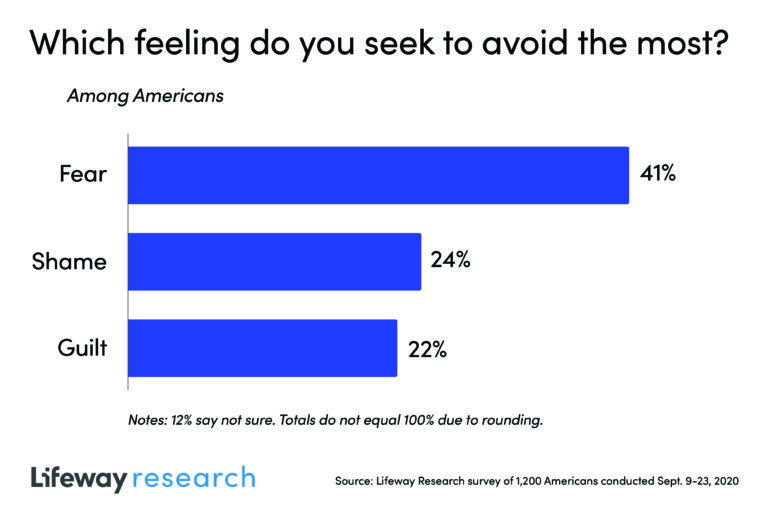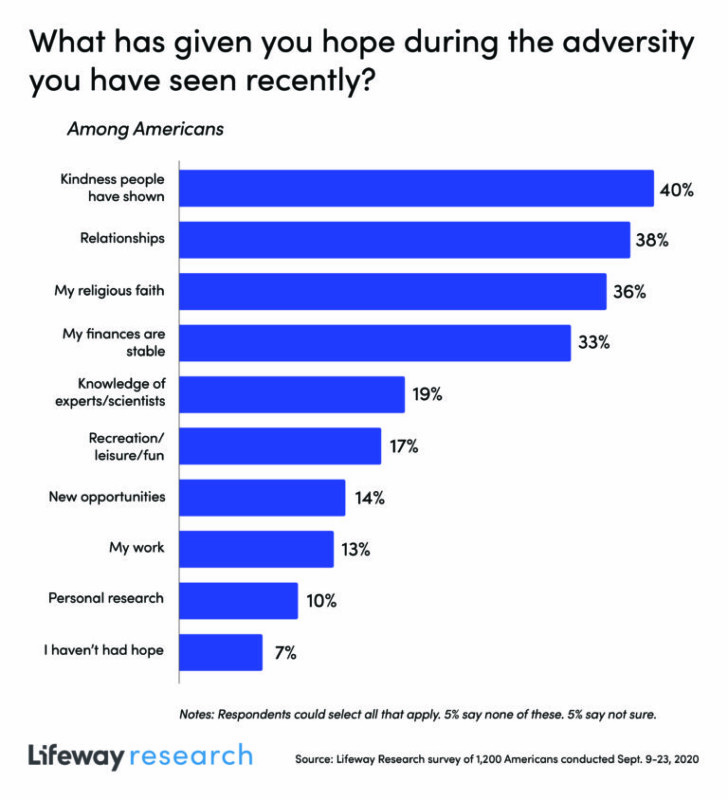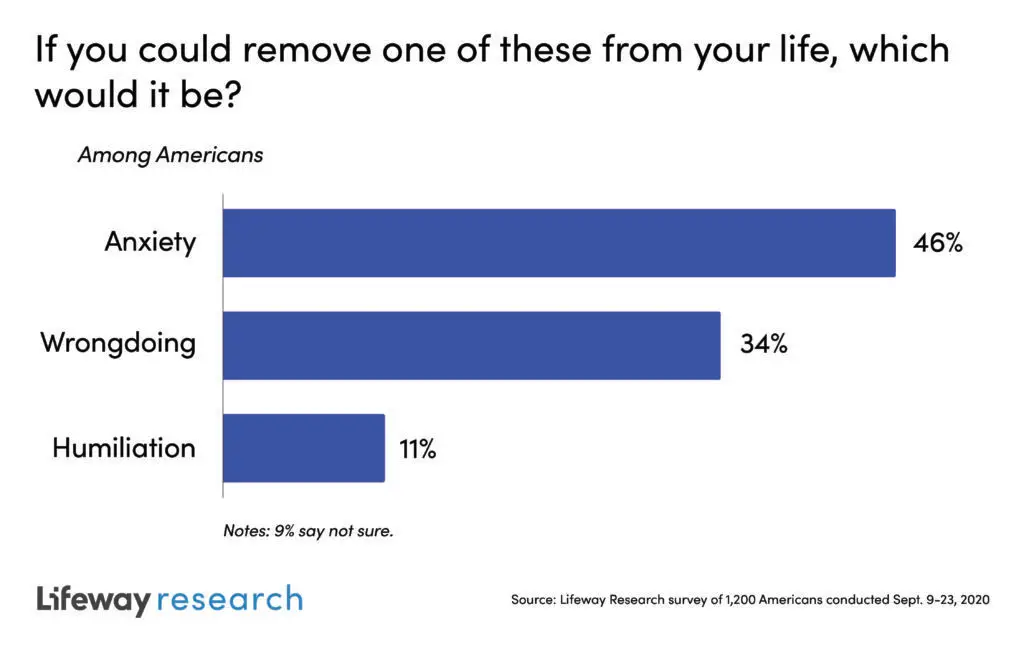NASHVILLE (BP) – After what was a scary year for many, more Americans say they want to avoid fear.
According to a study from Nashville-based Lifeway Research, when asked which feeling they seek to avoid the most, 4 in 10 U.S. adults (41 percent) say fear. Far fewer say shame (24 percent) or guilt (22 percent). Around 1 in 10 aren’t sure.
Fear topping the list is a marked change from a 2016 Lifeway Research study that found Americans more evenly divided, but with shame (38 percent) being the emotion people most wanted to avoid, followed by guilt (31 percent) and fear (30 percent).

“For many Americans, circumstances in 2020 led to an increased focus on their fears,” said Scott McConnell, executive director of Lifeway Research. “Many feared getting COVID; others feared social unrest during protests; and politicians played on people’s fears in ads and speeches.”
Adherents of non-Christian religions (57 percent), adults 65 and older (49 percent), and those with a high school diploma or less (46 percent) are among the Americans most likely to say they want to avoid fear most of all.
Whites (25 percent) and African Americans (30 percent) are more likely to try to avoid shame than Hispanics (18 percent). But whites (23 percent) and Hispanics (25 percent) are more likely to want to avoid feelings of guilt than African Americans (15 percent).
Sources of hope
When thinking about the adversity they faced last year, Americans looked around, looked up and looked at their bank accounts to provide them with hope.

The top source of hope for U.S. adults through 2020 is the kindness people have shown (40 percent), followed closely by relationships (38 percent), their religious faith (36 percent), and their finances being stable (33 percent).
“About half as many Americans who identify with a religious faith credit that faith with giving them hope during 2020,” McConnell said. “The Christian faith points followers of Jesus to a more hopeful future, which should shine even brighter during dark times.”
Fewer Americans drew hope from the knowledge of scientists and experts (19 percent), recreation or fun they had (17 percent), new opportunities (14 percent), their work (13 percent), or research they’ve done themselves (10 percent). One in 20 say none of these (5 percent) or they’re not sure (5 percent).
Around 1 in 14 U.S. adults (7 percent) say they haven’t had any source of hope during the problems they’ve faced in 2020.
Americans who struggle to find hope are more likely to be those with a high school diploma or less (8 percent) and the religiously unaffiliated (12 percent). Only 1 percent of Americans with evangelical beliefs say they had no hope in 2020 compared to 8 percent of those without such beliefs. Among Christians, those who attend worship services four times a month or more are less likely than those who attend less than once a month to have faced last year without hope (2 percent vs. 7 percent).
Americans want freedom and safety
When asked what they desire most in life, Americans are more likely to choose personal freedom (36 percent) than a desire to overcome (32 percent) or a desire for respect (24 percent), while 8 percent aren’t sure. In 2016, Lifeway Research found 40 percent of Americans had a desire for personal freedom, 28 percent a desire to overcome and 31 percent a desire for respect.
“The events of 2020 led some to reevaluate their priorities, with fewer desiring respect. But most responded from what was already a priority for them,” McConnell said. “Resistance to social distancing mandates was likely motivated by the desire for personal freedom. Speaking up about racial injustice was likely motivated by the desire to overcome power differences in society.”
Men (39 percent) are more likely than women (33 percent) to say they desire personal freedom most of all. College graduates (44 percent) are also more likely than those with a high school diploma or less (32 percent) to point to freedom as their top desire.
Younger adults are more likely to say they want to overcome, and older adults are more likely to want respect.
African Americans (39 percent) and Hispanics (40 percent) are more likely than whites (28 percent) to say they most desire to overcome.
U.S. adults are almost twice as likely to say the outcome they value most is obtaining security and safety (45 percent) compared to reaching their potential (25 percent) or bringing honor to my family and friends (24 percent).
Women (48 percent), along with adults 50-64 (51 percent) and those 65 and older (55 percent) are among those who most value safety. Younger adults (18-34) are the most likely to say their primary value is reaching their potential (39 percent).
Right and wrongdoing
While Americans overwhelmingly say they get the most satisfaction from doing the right thing, they’d much rather eliminate anxiety from their lives than wrongdoing.
Around 4 in 5 adults (79 percent) say it would bring them the most satisfaction to know they had done the right thing, compared to their political party being in power (7 percent) or obtaining social recognition or status (7 percent).
When asked what they would remove completely from their life if they could, however, Americans pick anxiety (46 percent) over wrongdoing (34 percent) and humiliation (11 percent).
U.S. adults are also most likely to say someone suffering unfairly (60 percent) angers them the most compared to someone breaking the law (29 percent) or someone embarrassing their community (5 percent).
“When Americans approach life so differently, it’s not surprising that we frequently misunderstand each other,” McConnell said.
Methodology:
The online survey of 1,200 Americans was conducted Sept. 9-23, 2020, using a national pre-recruited panel. Quotas and slight weights were used to balance gender, age, region, ethnicity, education, and religion to more accurately reflect the population. The sample includes an over-sample of Americans with evangelical beliefs providing additional reliability for breakouts of this group. Totals for all Americans reduce these responses to their correct proportion through weighting.
The completed sample is 1,200 surveys. The sample provides 95 percent confidence that the sampling error from the panel does not exceed plus or minus 3.2 percent. This margin of error accounts for the effect of weighting. Margins of error are higher in sub-groups. Comparisons are made to a Lifeway Research survey conducted Sept. 27 – Oct. 1, 2016 among 2,144 Americans using an online panel.
Evangelical beliefs are defined using the National Association of Evangelicals and Lifeway Research Evangelical Beliefs Research Definition based on respondent beliefs. Respondents are asked their level of agreement with four separate statements using a four-point, forced-choice scale (strongly agree, somewhat agree, somewhat disagree, strongly disagree). Those who strongly agree with all four statements are categorized as having evangelical beliefs:
- The Bible is the highest authority for what I believe.
- It is very important for me personally to encourage non-Christians to trust Jesus Christ as their Savior.
- Jesus Christ’s death on the cross is the only sacrifice that could remove the penalty of my sin.
- Only those who trust in Jesus Christ alone as their Savior receive God’s free gift of eternal salvation.
For more information, view the complete report or visit LifewayResearch.com.
This article was written by Aaron Earls, writer for LifeWay Christian Resources. It was published at baptistpress.com.

